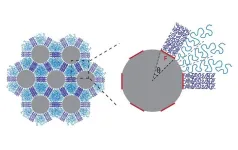(Press-News.org) UCSF researchers are the first to demonstrate that the approach works for the patients who need it the most.
Patients who struggle to take daily HIV pills can benefit from long-acting injectable treatments, a new study by researchers at UCSF has found.
The strategy could also help stop the spread of HIV by keeping more patients from being infectious.
In 2021, federal regulators approved the first long-acting antiretroviral (LA-ART) injectable, which is a combination of long-acting cabotegravir and rilpivirine. But they only approved it for HIV patients who already had their infections under control with pills.
Researchers at UCSF wanted to see if it would work for patients who could not control their infections with pills, whether that was because they had trouble swallowing or remembering, or because they did not have a place to live and faced other life challenges, such as substance use disorder.
So, they gave these patients monthly or bimonthly injections and compared their viral loads to other patients who already had their viral loads controlled with oral medication before starting injectable HIV therapy.
More than 98% of participants in both groups had what’s known as “viral suppression,” or undetectable levels of HIV, after 48 weeks. It is the largest and longest such comparison. The paper appears March 6 in JAMA.
‘Transformative’ for people with adherence challenges
The research, which was supported by the National Institutes of Health’s National Institute of Allergy and Infectious Diseases, could help stop the spread of HIV, since those who are virally suppressed cannot transmit the virus.
And it’s a game changer for patients who have trouble maintaining a regimen that requires multiple pills each day.
“These long-acting treatments are likely to be transformative for people in this population,” said Matthew Spinelli, MD, assistant professor in the Division of HIV, Infectious Diseases and Global Medicine at UCSF and first author of the paper. “We’ve had folks who struggled for years and when we put them on injectables, it’s like magic. It’s exciting to see success in the population we’re most worried about.”
The publication of the JAMA article was timed to coincide with the presentation of the findings at the 2025 Conference on Retroviruses and Opportunistic Infections (CROI), which is being held in San Francisco from March 9 to 12. The annual conference brings together researchers from around the world who are focused on HIV/AIDS and related conditions.
To conduct this evaluation, the researchers relied on patient data from the Special Program on Long-Acting Antiretrovirals to Stop HIV, or SPLASH, at Ward 86, the UCSF HIV/AIDS clinic at Zuckerberg San Francisco General Hospital.
They studied data from 370 patients – 129 of whom had detectable viral load levels when they started on injectables, and 241 of whom did not – from January of 2021 through September of 2024.
After about 11 months, 99% of those who were virally suppressed when they started the injectable medication continued to have no detectable HIV in their blood. The results were essentially the same for the group that started injectables before getting the virus under control: 98% achieved viral suppression in that period.
The paper’s senior author, Monica Gandhi, MD, MPH, professor of medicine, associate division chief of UCSF’s Division of HIV, Infectious Diseases, and Global Medicine, and medical director of the Ward 86 HIV clinic, said the U.S. Department of Health and Human Services and the International Antiviral Society-USA have already updated guidance to recommend this strategy, partially as a result of UCSF’s data.
“We hope our results will encourage providers around the country to use long-acting ART in those with detectable viral loads and adherence challenges,” she said. “It really works.”
Authors: Additional UCSF authors include senior author Monica Gandhi, MD, MPH, and co-authors Megan J. Heise, PhD, Nathanial Gistand, Chesa Cox, MPH, Janet Grochowski, PharmD, Jon Oskarrson, RN, and David V. Glidden, PhD.
Funding: Funding for this work includes a grant from the National Institutes of Health’s National Institute of Allergy and Infectious Diseases (5R37AI098472).
About UCSF: The University of California, San Francisco (UCSF) is exclusively focused on the health sciences and is dedicated to promoting health worldwide through advanced biomedical research, graduate-level education in the life sciences and health professions, and excellence in patient care. UCSF Health, which serves as UCSF's primary academic medical center, includes top-ranked specialty hospitals and other clinical programs, and has affiliations throughout the Bay Area. UCSF School of Medicine also has a regional campus in Fresno. Learn more at ucsf.edu, or see our Fact Sheet.
###
Follow UCSF
ucsf.edu | Facebook.com/ucsf | YouTube.com/ucsf
END
Injectable Therapy is 'magic' for those who can’t take HIV pills
2025-03-06
ELSE PRESS RELEASES FROM THIS DATE:
siRNA-AGO2 complex inhibits bacterial gene translation: a novel therapeutic strategy for superbug infection
2025-03-06
Multidrug-resistant bacteria pose a major threat to human health. Manipulation of bacterial genes at the transcriptional level is a potential strategy to fight antibiotic-resistant bacterial infections by silencing their resistance genes. However, siRNAs have not been applied to regulate bacterial genes due to the lack of RNAi regulatory machinery, i.e., RNA-induced silencing complexes (RISCs), in bacteria. In addition, efficient methods for delivering siRNAs to bacteria in vivo are not currently available. In this study, ...
Memory is impaired in aged rats after 3 days of high-fat eating
2025-03-06
COLUMBUS, Ohio – Just a few days of eating a diet high in saturated fat could be enough to cause memory problems and related brain inflammation in older adults, a new study in rats suggests.
Researchers fed separate groups of young and old rats the high-fat diet for three days or for three months to compare how quickly changes happen in the brain versus the rest of the body when eating an unhealthy diet.
As expected based on previous diabetes and obesity research, eating fatty foods for three months led to metabolic problems, gut inflammation and dramatic shifts in gut bacteria in all rats compared to those that ate normal chow, while just three days of ...
Artificial muscles for tremor suppression
2025-03-06
Key points:
Slim and lightweight HASEL artificial muscles effectively suppress human tremor
Reproduction of patient recordings of tremor episodes in a robotic platform/mechanical patient
Computer simulation of tremor arm validates that forces are sufficient for practical applications
Avoiding time consuming clinical testing in early stages of technology development
Stuttgart/Tübingen – It is estimated that around 80 million people worldwide live with a tremor. For example, those who live with Parkinson's disease. The involuntary periodic movements sometimes strongly affect how patients are able ...
A new way to engineer composite materials
2025-03-06
— By Rachel Berkowitz
Composite adhesives like epoxy resins are excellent tools for joining and filling materials including wood, metal, and concrete. But there’s one problem: once a composite sets, it’s there forever. Now there’s a better way. Researchers have developed a simple polymer that serves as a strong and stable filler that can later be dissolved. It works like a tangled ball of yarn that, when pulled, unravels into separate fibers.
A new study led by researchers ...
AERA selects 29 exemplary scholars as 2025 Fellows
2025-03-06
WASHINGTON, March 6, 2025—The American Educational Research Association (AERA) has announced the selection of 29 exemplary scholars as 2025 AERA Fellows. The AERA Fellows Program honors scholars for their exceptional contributions to, and excellence in, education research. Nominated by their peers, the 2025 Fellows were selected by the Fellows Committee and approved by the AERA Council, the association’s elected governing body. They will be inducted during a ceremony at the 2025 Annual Meeting in Denver on April 24. With this cohort, there will be a total of 791 AERA Fellows.
“The ...
Touchless tech: Control fabrics with a wave of your finger
2025-03-06
A team of researchers from Nottingham Trent University (UK), Helmholtz-Zentrum Dresden-Rossendorf (HZDR) and Free University of Bozen-Bolzano (Italy) has created washable and durable magnetic field sensing electronic textiles – thought to be the first of their kind – which they say paves the way to transform use in clothing, as they report in the journal Communications Engineering (DOI: 10.1038/s44172-025-00373-x). This technology will allow users to interact with everyday textiles or specialized clothing by simply pointing their finger above a sensor.
The researchers show how they placed tiny flexible ...
JMIR aging invites submissions on the social and cultural drivers of health in aging adults
2025-03-06
(Toronto, March 6, 2025) JMIR Publications invites submissions to a new theme issue titled Social and Cultural Drivers of Health in Aging Populations in its open access journal JMIR Aging. The premier, peer-reviewed journal is indexed in PubMed, PubMed Central, MEDLINE, DOAJ, Scopus, and the Science Citation Index Expanded (Clarivate).
As aging populations grow worldwide, understanding the social and cultural factors that impact health outcomes in older adults has become a critical area of study. This theme issue aims to highlight the role of digital health ...
New research sheds light on why scleroderma affects mostly women and how to treat it
2025-03-06
Two new studies led by researchers at Hospital for Special Surgery (HSS) have uncovered key biological mechanisms driving systemic sclerosis (SSc), or scleroderma – a rare and often devastating autoimmune disease that causes fibrosis (tissue hardening) and inflammation. The research, published in the March issue of the Journal of Experimental Medicine, helps explain why the disease disproportionately affects women and reveals potential treatment targets, some of which are already in development.
Scleroderma affects approximately 300,000 people in the U.S., with about one-third ...
Lack of appropriate mental health care impacts quality of life for people with COPD
2025-03-06
Miami (March 6, 2025) – Mental health disorders in people with chronic obstructive pulmonary disease (COPD) are underdiagnosed and undertreated, leading to worsened symptoms and decreased quality of life, according to a new study. The study is published in the January 2025 issue of Chronic Obstructive Pulmonary Diseases: Journal of the COPD Foundation, a peer-reviewed, open-access journal.
COPD is an inflammatory lung disease, comprising several conditions, including chronic bronchitis and emphysema, and ...
Yawn! Many people are bored by spiritual practice
2025-03-06
We commonly consider spiritual practices sources of peace and inspiration. A recent study led by researchers of the University of Vienna shows that they can also be experienced differently: Many persons feel bored during these practices – and this can have far-reaching consequences. The results recently published in the academic journal Communications Psychology open up an entirely new field of research and provide fascinating insights into a phenomenon that has received only scant attention so far.
Even though boredom is a heavily researched subject at the moment, spiritual boredom has so far been largely neglected in research. Psychologists at the University of ...




